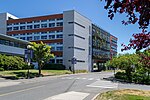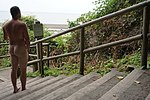St. John's College, University of British Columbia
St. John's College is one of two residential colleges at the University of British Columbia which are modeled on the Oxbridge collegiate system, the other being Green College. It provides a community for graduate students and postdoctoral researchers, with an international focus. St. John's College maintains close ties with Green College and the University of Cambridge in the United Kingdom. The college consists of a residential community of 160 graduate students, postdoctoral researchers, visiting scholars and professors, and non-resident affiliated faculty and academic programming. The College is located at the West end of the UBC campus, near Wreck Beach. Aside from taking up residence at St. John's, residential membership entails active involvement in the social and academic aspects of College life. Involvement takes the form of participation on various social and academic committees, and attendance at functions and lectures sponsored by or otherwise linked with the College. Dining together is an integral part of the St. John's College experience. The college is home to the Dining Society which provides meals five days a week to residents and guests.
Excerpt from the Wikipedia article St. John's College, University of British Columbia (License: CC BY-SA 3.0, Authors).St. John's College, University of British Columbia
University Boulevard, Electoral Area A University of British Columbia
Geographical coordinates (GPS) Address Nearby Places Show on map
Geographical coordinates (GPS)
| Latitude | Longitude |
|---|---|
| N 49.26266 ° | E -123.256833 ° |
Address
University Boulevard - šxʷyəθəstəm
University Boulevard
V6T 1Z2 Electoral Area A, University of British Columbia
British Columbia, Canada
Open on Google Maps





